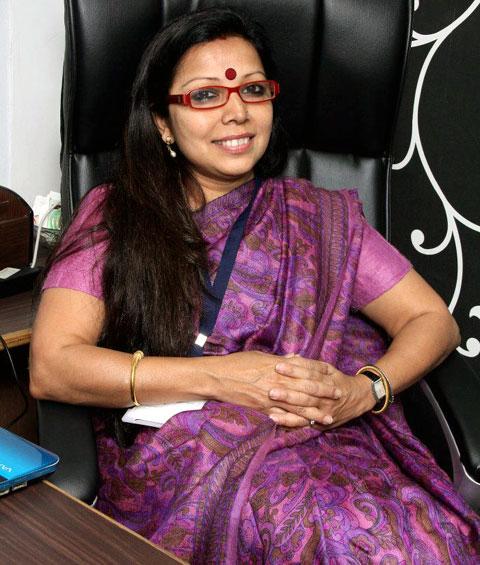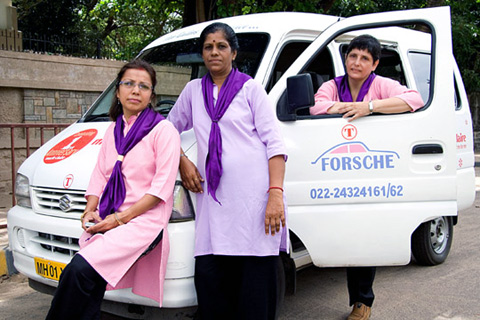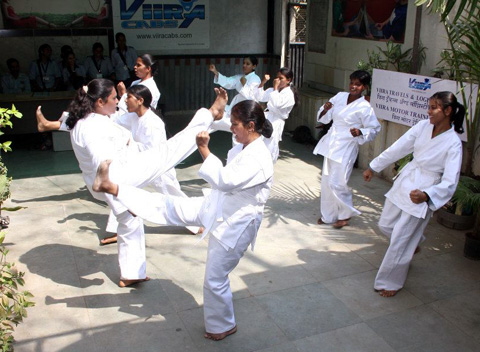 | « Back to article | Print this article |
'The bechara attitude in women must go'
Founder of India's first all-women taxi service, Revathi Roy says women need to stop feeling victimised and helpless all the time. For those who are willing to risk, and move ahead of the challenges, the sky is the limit, she beckons.
March 8 is a special day for Revathi Roy. Six years ago, Roy recollects starting the country's first all-women taxi service.
Since then, she has been instrumental in training and employing over thousand women as taxi drivers across the length and breadth of the country through two of her entrepreneurial ventures: ForShe Ladies Taxi Service and Viira Cabs.
From convincing the families of several underprivileged women to let their girls join her in the quest to being responsible for altering the lives and careers of over thousands of women, Roy's journey to success hasn't been an easy one.
On International Women's Day, the 50-something entrepreneur who also mentors young women on entrepreneurship and women empowerment projects rubbishes the idea that women are treated unfairly in our country.
In fact, she says it's time Indian women gave up asking for sympathy and did something about chasing what they truly deserves. Read on for interesting insights from the entrepreneur....
What according to you are the greatest issues facing Indian women?
I don't understand why we need to be so gender sensitive about issues. I feel the problems and issues are largely the same for men and women.
Travelling, for one is equally bad in the metros for both men and women thanks to bad roads. The opportunities are the same, and they are equal, so what are we complaining about?
If a woman is pregnant, she can avail of maternity leave, but what about men? Don't they share the responsibility of the newborn? I think we are narrowing our views by saying that women should have incentives over men.
If someone in the family is unwell, it is always the women who stay back home because that's how it's always been. Nobody accepts the fact that even a man needs to be available for his family when there is a crisis.
So, women are naturally good at multitasking, but there is no need to get so sensitive about it and make it seem like a big deal.
May be somewhere down the journey, the men can share the responsibility and let the women concentrate on her career or family.
But that's an individual choice, we can't enforce it anybody. There are no written rules on who must do what.
But you did face problems employing women drivers...
Yes it wasn't easy but not impossible. I have successfully trained and skilled thousands of women in the country and made them ready for employment.
In fact I can proudly say that every woman driver in this country may at some point of their careers be trained by us. And if you ask anyone who has availed our service they will tell you that our women are as professional as any male drivers in the country.
From my own experience I can tell you that the opportunities for women drivers are plenty but there are very few families who are willing to let their women go and make that choice.
Please click NEXT to continue reading...
'You never know what you're capable of, until you actually set to do it'
Can you tell us a little more about the problems you faced while training underprivileged women?
When I set out to train young underprivileged women, I realised that it wasn't as easy as it seemed to be.
I had to go door to door, talk and convince almost everyone in the family to send their girls for training. Initially, most of them were reluctant.
It's only when they learnt that our training included self-defence, they were assured about the girl's safety. But that was just the beginning of challenges.
Since the women I employed as drivers were highly trained for the job, I would pay them anything between Rs 8,000 to 12,000.
With such remuneration, their demand in matrimony would go up. Sooner or later, they would quit because their in-laws would not allow the girls to work.
So, besides convincing the girl's family, I have to further convince her in-laws to let her keep the job.
Sustainability was a major issue.
What did the experience teach you as an entrepreneur?
It taught me that if there are challenges, I have to be smart enough to overcome it.
If I would have sat at home thinking 'I have no workforce, nobody will hire women drivers', I would have gotten nowhere.
But I wore the uniform myself, hired a taxi and went door to door to get my first set of women drivers. Sometimes, you have to make tough choices.
When the dream finally saw the light of the day, a lot of people were amazed at the idea.
I have learnt that you never know what you are capable of, until you actually set to do it.
'Women are resilient, hard working, perseverant and strong willed'
Do you think there is anything the government or corporate organisations can do about empowering women?
If we are talking about new public schemes, I feel there are already enough that are not being used and reaching the right people.
There are various schemes on free primary education, subsidised higher education, scholarships for higher studies, rural employment, providing healthy work environment for women, maternity leave policy, so on and so forth.
We have to find ways how to avail them.
Despite being an entrepreneur who works with women and for women, I am ignorant about some of these schemes, but I'm learning and will eventually find out and see how we can benefit from them.
Do you have a message for our readers?
I would like to use this opportunity to reiterate that the women should stop feeling that they are not treated as equals.
First and foremost, this bechara attitude has to go. Women must stop feeling helpless.
It would be unfair to say that there is lack of opportunities for women. The opportunity is out there, but it won't come knocking at your door, you have to go to it.
If you have the skills, it is totally up to you to decide what you choose to do with it.
You can sit at home and complain for the rest of your lives or go there and make it work for you -- the choice is entirely yours.
There is a famous line by American political leader Eleanor Roosevelt, she said, "A woman is like a tea bag, you never know how strong it is until it's dipped in hot water."
Take the poorest of poor women, they come from challenging backgrounds and yet never give them, they fight a battle every day. That's how strong women actually are.
They are resilient, hard working, perseverant and strong willed. To all my women friends, I would just say this -- never give up, ever!


